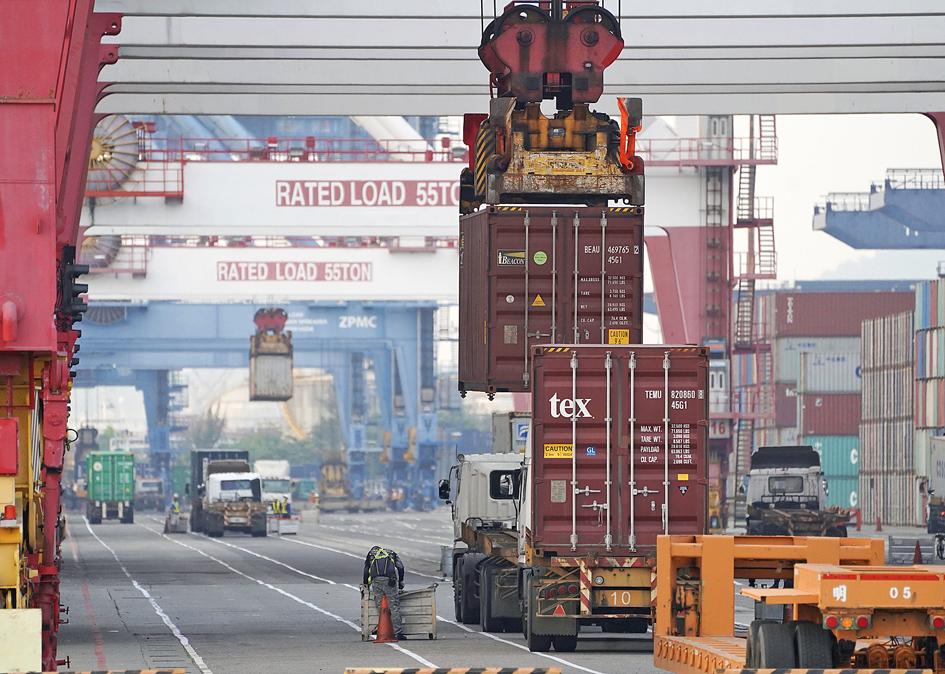Exports last month surged 36.8 percent from a year earlier to a record high of US$34.27 billion, as demand from around the world for technology and non-tech products gained momentum, the Ministry of Finance said yesterday.
The momentum looks set to continue this month with a 3 to 8 percent increase, despite the week-long Lunar New Year holiday beginning tomorrow and running through Tuesday next week, Department of Statistics Director-General Beatrice Tsai (蔡美娜) said.
“The strong showing is ... more than double the 5.2 percent increase the Directorate-General of Budget, Accounting and Statistics predicted in November last year,” Tsai told a news conference, adding that the statistics agency would update its projection on Saturday next week.

Photo: CNA
Major technology firms have asked employees to work over the holiday to help ease supply constraints, Tsai said.
There are acute shortages of wafers, flat panels, passive components, printed circuit boards and other electronic parts, as the COVID-19 pandemic is boosting sales of TVs, laptops and gaming consoles, she said.
Exports of electronics soared 47.5 percent year-on-year to an unprecedented US$13.29 billion, while semiconductors increased 46.3 percent to US$11.92 billion, the ministry’s monthly report showed.
Chip shortages have also prompted automakers in Japan, Germany and the US to slow operations, despite clear order visibility.
Exports of optical devices spiked 53.5 percent to US$1.2 billion, driven primarily by avid demand for panels used in TVs, notebook computers and tablets, Tsai said.
Inventory building extended to non-tech products, which all reported double-digit growth from a year earlier, with the exception of mineral products, which shrank 36.5 percent year-on-year, dragged by cheaper oil prices and lackluster demand, she said.
Demand from Asia accounted for 72.6 percent of Taiwanese exports, as ASEAN member states, China and Japan fared better during the pandemic than Europe and the US, Tsai said.
Exports to China soared 57 percent, while those to Japan grew 21.5 percent and shipments to Southeast Asian countries jumped 40.7 percent, the report said.
Shipments to the US rose 21.9 percent, while exports to Europe increased 15.8 percent, the report showed.
Imports bounced 29.9 percent to US$28.08 billion, giving Taiwan a trade surplus of US$6.19 billion, up 80.2 percent from a year earlier, the report said.
Inbound shipments of electronics rose 48.9 percent, while information and communications technology products grew 70 percent, Tsai said.
Imports of capital equipment rose 19.5 percent to US$4.76 billion, the report said, consistent with positive capital spending guidance by local tech firms.

To many, Tatu City on the outskirts of Nairobi looks like a success. The first city entirely built by a private company to be operational in east Africa, with about 25,000 people living and working there, it accounts for about two-thirds of all foreign investment in Kenya. Its low-tax status has attracted more than 100 businesses including Heineken, coffee brand Dormans, and the biggest call-center and cold-chain transport firms in the region. However, to some local politicians, Tatu City has looked more like a target for extortion. A parade of governors have demanded land worth millions of dollars in exchange

Hong Kong authorities ramped up sales of the local dollar as the greenback’s slide threatened the foreign-exchange peg. The Hong Kong Monetary Authority (HKMA) sold a record HK$60.5 billion (US$7.8 billion) of the city’s currency, according to an alert sent on its Bloomberg page yesterday in Asia, after it tested the upper end of its trading band. That added to the HK$56.1 billion of sales versus the greenback since Friday. The rapid intervention signals efforts from the city’s authorities to limit the local currency’s moves within its HK$7.75 to HK$7.85 per US dollar trading band. Heavy sales of the local dollar by

Taiwan Semiconductor Manufacturing Co’s (TSMC, 台積電) revenue jumped 48 percent last month, underscoring how electronics firms scrambled to acquire essential components before global tariffs took effect. The main chipmaker for Apple Inc and Nvidia Corp reported monthly sales of NT$349.6 billion (US$11.6 billion). That compares with the average analysts’ estimate for a 38 percent rise in second-quarter revenue. US President Donald Trump’s trade war is prompting economists to retool GDP forecasts worldwide, casting doubt over the outlook for everything from iPhone demand to computing and datacenter construction. However, TSMC — a barometer for global tech spending given its central role in the

An Indonesian animated movie is smashing regional box office records and could be set for wider success as it prepares to open beyond the Southeast Asian archipelago’s silver screens. Jumbo — a film based on the adventures of main character, Don, a large orphaned Indonesian boy facing bullying at school — last month became the highest-grossing Southeast Asian animated film, raking in more than US$8 million. Released at the end of March to coincide with the Eid holidays after the Islamic fasting month of Ramadan, the movie has hit 8 million ticket sales, the third-highest in Indonesian cinema history, Film